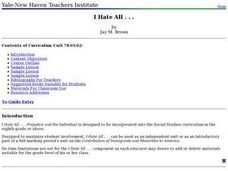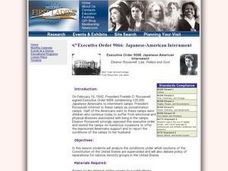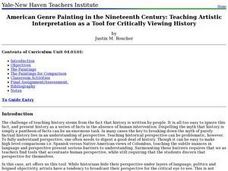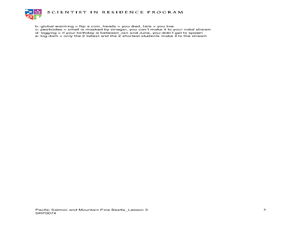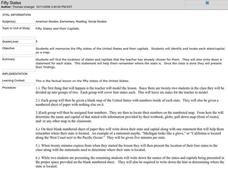Curated OER
I Hate All . . .
Students examine the concept of prejudice of human beings towards other human beings. They define prejudice and analyze the history of the word, read a U.N. Commission Report on prejudice, and examine textbooks for prejudice.
Curated OER
The 1970s in America
In this 1970s worksheet, 9th graders answer ten questions with a word or phrase, decide which event (in three different pairs) occurred first, then link two groups of words together by writing what they share in common.
Curated OER
Evolution vs. Intelligent Design
Ninth graders explore the arguments surrounding evolution versus intelligent design have affected relationships among people of different religious backgrounds. In this ethics lesson plan, 9th graders determine whether relationships...
Curated OER
Biomes -- Part 1
Students use the internet to locate and gather information on the world's biomes. They compare and contrast biomes to ecosystems and describe the human effects on ecosystems. They answer questions to end the lesson.
National First Ladies' Library
Executive Order 9066: Japanese-American Internment
Pupils analyze conditions under which sections of United States Constitution are superceded, research history of Native Americans, African Americans, and Japanese Americans, and debate policy of reparations for various minority groups in...
Curated OER
Lesson 2: The Story of Flagstaff
Students, in groups, write and perform a skit that retells the story of the flooding of Flagstaff.
Curated OER
Parts of a Computer
Students, after identifying the parts of a computer, and categorizing the parts by functions (input, output, process, and storage), explore how all the parts of a computer work together. They compare/contrast the differences between...
Curated OER
Motion, Force, and Gravity
Learners write a research paper about human space travel. In this space travel lesson, students watch a video and research issues related to space travel. They use their research to write a paper about whether human space travel should...
Curated OER
American Genre Painting in the Nineteenth Century: Teaching Artistic Interpretation as a Tool for Critically Viewing History
Students view a variety of artwork to determine the history and lifestyle of people from New Haven, Connecticut. In groups, they develop their individual hypothesis about why the paintings were created and share them with their group...
Curated OER
Special Report: Flood of the Great River
Learners work together in groups and role play the role of television crews. Using the internet, they research specific events of the Mississippi River flooding and report their findings to the class from different angles. They are to...
Curated OER
Introductory Lesson For the Beginning of Each New Year
Learners explore the five values of truth, love, peace, righteousness, and non-violence. Students read a story and a poem, sing songs, and participate in hands-on activities to investigate and reinforce values. In groups, learners act...
Curated OER
Due Process of Law and the Jim Crow Era
High schoolers analyze eight case studies of Supreme Court decisions regarding due process of law and their impact on American society in the early 20th century. They digest that although the 14th amendment was intended to give federal...
Curated OER
Children's Literature Meets Learning Theories
Students examine learning theories and principles through children's literature. In groups, they select theories and create multimedia presentations exemplifying them. Students discuss the various themes related to human growth,...
Curated OER
Sight and Light
Young scholars examine the eyeball and its parts. In this sight lesson students divide into groups and complete a lab activity that includes creating a model.
Curated OER
Economic and Social Changes in the High Middle Ages
Young scholars investigate the economic and social changes that occurred in the High Middle Ages. They listen to a lecture and take notes, and in small groups compose a medieval charter and role-play its presentation to the class.
Curated OER
Funny Face Self Portraits
Students gain appreciation for the drawings by Leonardo da Vinci. They show human emotion by drawing facial features in correct proportion - studying ratio of eye width to the rest of the facial features. They create values by varying...
Curated OER
Invertebrates and Vertebrate Evolution
Students explore the major characteristics of the major animal phyla. They describe adaptive features that have contributed to the success of animals on land. Students explain how primate evolution provides a context for understanding...
Curated OER
The Abolitionist Movement
Students examine the Abolitionist Movement in Delaware. In groups, they examine a petition presented to the general assembly and an anti-slavery broadside. They compare and contrast the two documents and develop their own broadside to...
Curated OER
Salmon Migration
Students examine how salmon find their way to their home stream during migration. In this migration lesson students see some of the different migratory challenges that salmon face and see how humans affect the migration by completing an...
Curated OER
Creating the Model
Students comprehend what has been explored in the previous earthquake engineering design lessons, by putting their designs to the test.
They are given pairs a piece of paper, and an empty plastic bottle or can. Students stand the...
Curated OER
Plants and Animals: Partners in Pollination
Students identify the plant parts and bee structures that are involved in pollination. They simulate pollination in a group activity and process the information.
Curated OER
Fifty States
Fifth graders find each state and its capital city on a map before memorizing the information. They work in small groups after watching a modeled activity by the teachers. They write a statement about their assigned states and capital...
Curated OER
Personality Development
Students participate in a variety of activities to help them define their own personalities. They complete questionnaires, play personality Bingo, and compare kaleidoscopes and candy to the variety found in humans.
Curated OER
You Don't Say!!
Fourth graders write and respond to sayings throughout the school year. They define the idioms, illustrate them and compare their meanings with other groups in the class.


